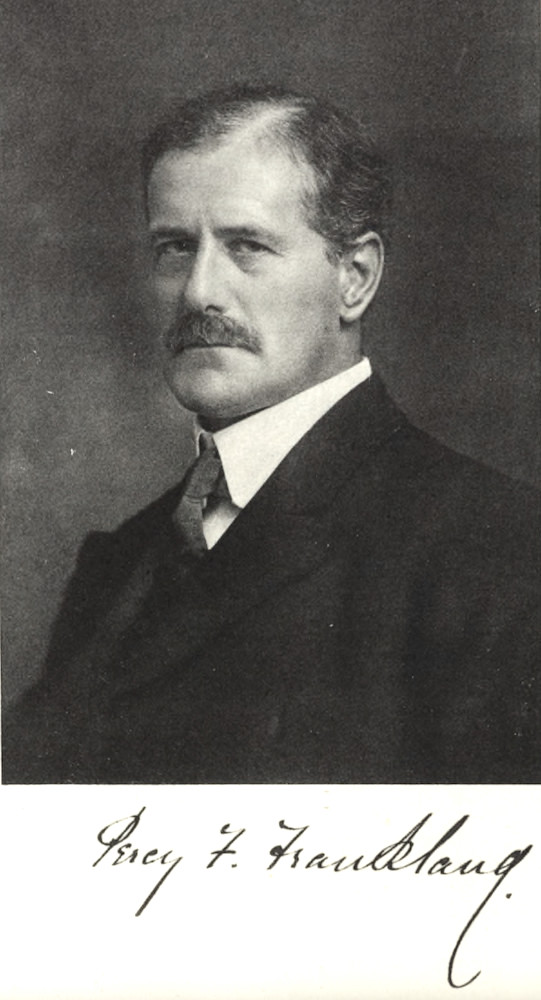
Percy Frankland, from W. E. Garner's "Percy Faraday Frankland. 1858-1946," Obituary Notices of Fellows of the Royal Society 5, no. 16 (1948): facing p.697.
Percy Faraday Frankland, a chemist and bacteriologist, (1858-1946) was born in London on 3 October 1858. He was the second son of Edward Frankland, professor of chemistry at the newly established Royal School of Mines, who named him in honor of his godfather, the legendary Victorian scientist Michael Faraday (1791-1867). From 1869-1874, Frankland studied at University College School in London before matriculating in 1875 at the Royal School of Mines where he studied with his father and Thomas Henry Huxley. In 1877, intending to take up medicine, he moved on to St. Bartholomew’s Hospital, but his father convinced him to follow a career in chemistry instead.
In the period of retraining that followed, Frankland studied organic chemistry with Wislicenus at the University of Würzburg, earning a Ph.D. with honors in 1880. He returned to London where a position awaited him at the Royal School of Mines, now located in South Kensington and called the Normal School of Science. In 1881 the University of London granted him the B.Sc., and in 1882 he married the research bacteriologist Grace Coleridge Toynbee, with whom he would write several important texts including Pasteur (1898), a widely admired biography of the eponymous scientist.
From 1888-94, Frankland was a professor of chemistry at University College, Dundee. In 1891, he was elected a fellow of the Royal Society. Three years later, he left his Dundee post for Mason Science College (later the University of Birmingham) where he remained until 1919, serving once as dean of the Faculty of Science. During World War I, Frankland worked on synthetic drugs, explosives, and mustard gas for the Chemical Warfare Committee, work for which he was named CBE in 1920.
Frankland was interested in water analysis in relation to bacteriology, especially if that research could be dovetailed with methods for identifying and countering the bacterial contamination of water sources. Frankland investigated the use of coke, greensand, and other materials for water filtration, and he analysed the changing virulence and viability of anthrax and typhoid bacilli in different concentrations in drinking water. His work on water analysis prompted the inauguration, in 1895, of monthly bacteriological examinations of London’s water supplies. In the early 1890s, he collaborated with Harry Marshall Ward in publishing four reports based on his experiments to the Royal Society's Water Research Committee. In 1893, Frankland penned a successful popular book about bacteriology titled Our Secret Friends and Foes . The following year he collaborated with his wife on a more scholarly treatment, Micro-organisms in Water: Their Significance, Identification and Removal.



Left to right: (a) Microrganisms in Water (1894): 81. (b) Frontispiece and title-page of Pasteur (1898). (c) Cover of Our Secret Friends and Foes (1899).
From 1906-09, Frankland served as president of the Institute of Chemistry. In 1912-13, he was president of the Chemical Society. The Royal Society awarded Frankland its Davy Medal in 1919, and over the course of his long and illustrious career he was also awarded honorary doctorates from four universities (St. Andrews in 1902, Dublin in 1912, Birmingham in 1924, and Sheffield in 1926). The Royal Institute of Chemistry established a memorial lecture in his name after his death in 1948.
Bibliography
Gieson, Gerald L. "Frankland, Percy Faraday." Complete Dictionary of Scientific Biography. New York: Charles Scribner's Sons, 2008, V, pp. 127-129.
Created 1 February 2023
Last modified (images added) 8 April 2023